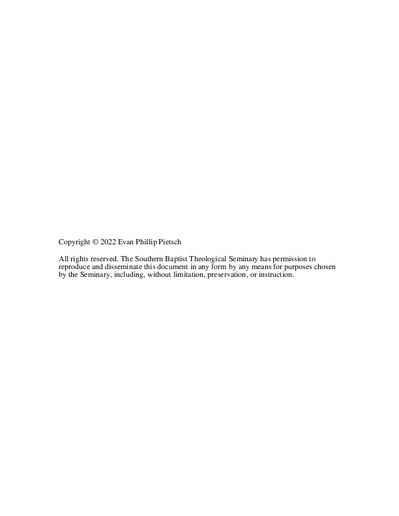| dc.description.abstract | This thesis demonstrates that Wagner’s philosophy of discipleship emerged from a theological basis established in open theism, affirming God limited his foreknowledge and omnipotence while denying his immutability. Moreover, an underlying consequentialist ethic drove Wagner’s understanding and praxes of the Great Commission. Wagner’s telos sought to create disciples by any means necessary so that God could instill his will upon the earth. This research introduces three new terms to articulate Wagner’s theological convictions and praxes: divine interventional mutability, cooperationism, and commissional pragmatic consequentialism. Chapter 1 introduces the need for the research. Chapters 2, 3, and 4 articulate Wagner’s primary theological dispositions concerning the doctrine of God throughout his career (1952–2016). Chapter 5 provides the research conclusions and articulates the implications of Wagnerian theology on discipleship praxes and ethics. Wagner’s early theological writings demonstrated minimal parity with open theism, though some functional similarities existed. His early philosophy of discipleship emphasized individual means by the sovereign work of the Holy Spirit through theological education. As Wagner progressed through life, his theological writings aligned with open theism. Wagner’s theological basis evolved into a pragmatic means of discipleship, affirming God’s dependency upon the prayers of humanity. In 2001, Wagner formally adopted open theism and articulated a revised means of discipleship through Dominion theology, marginalizing theological education. In conclusion, within the context of Wagner’s scriptural narrative, his philosophy of discipleship manifests as a means to implement the will of God on earth. An abundance of disciples means the greater installment of God’s will; therefore, Christ can return once all things have come under his authority. Wagner continuously changed his discipleship praxes throughout his career by measuring the phenomenological success of his discipleship methods. In the end, Wagner’s means of discipleship manifested from the contextual narrative of open theism all along. | en_US |

